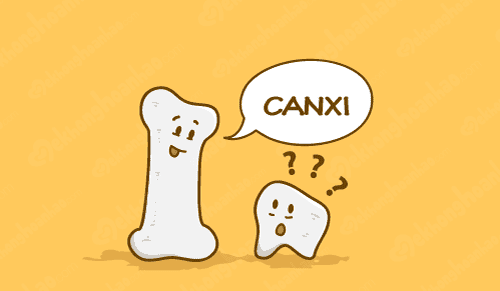This is an automatically translated article.
Studies have clearly confirmed that calcium intake is useful in the prevention and treatment of osteoporosis. However, adults living in the community are rarely concerned or unaware of the potential side effects of inappropriate or high doses of calcium supplements.
1. Calcium supplements and uses
Calcium is an important integral component of the human body and is very important for human health. Calcium is an essential mineral for building bones and teeth. The heart, nerves, and blood-clotting system in the body also need calcium to function properly.
Bones and teeth contain more than 99% calcium in the human body. In addition, blood, muscles and other tissues contain small amounts of calcium. Calcium in bones can be used as a reserve that can be released into the body when needed. Calcium levels in the body tend to decline as we age because it is eliminated from the body through sweat, skin cells and waste products. In addition, as women age, the ability to absorb calcium tends to decline due to decreased estrogen levels. Calcium absorption can vary depending on race, sex, and age. Bones are always breaking down and rebuilding and calcium is needed for this process. Taking extra calcium helps bones rebuild properly and strong.
Popular calcium-rich foods today are milk and dairy products, some vegetables like kale and broccoli. Besides citrus juices, mineral water, canned fish with bones and soy products are also rich in calcium. In addition, Calcium is also used as a supplement. Calcium is often taken by mouth to treat and prevent calcium deficiency in the body. They are also used for health problems associated with low calcium levels including muscle cramps (latent extremities), osteoporosis (weak bones due to low bone density), rickets (a condition in children associated with bone softening due to calcium deficiency) and osteomalacia (a condition in which the bones are soft and cause pain to the patient).
Calcium is also sometimes taken orally to reduce parathyroid hormone levels (hyperparathyroidism) and symptoms of premenstrual syndrome (PMS), among other conditions. Calcium carbonate is taken orally as an antacid for "heartburn". Calcium carbonate and calcium acetate are also taken orally to lower phosphate levels in patients with kidney disease.

Canxi là một khoáng chất thiết yếu để cấu tạo nên xương và răng
2. Side effects of calcium supplements
2.1 When taken by mouth
Calcium has been shown to be absolutely safe for most people when taken by mouth and in recommended amounts (about 1000-1200 mg per day). Calcium can cause some minor side effects such as belching or bloating, but these are usually not serious. But calcium may not be safe when taken by mouth in high doses. The American Institute of Medicine has set the daily tolerable calcium intake (UL) for calcium at 2000mg for adults 19-50 years old and 1500mg for adults 51 years and older.
Taking more than this amount of calcium daily can increase your risk of serious side effects, such as too high blood calcium levels and milk alkaline syndrome, a condition that can lead to kidney stones, kidney failure, and kidney failure. kidney or even death. There is also concern that supplemental calcium may increase the risk of heart attack as well as heart-related conditions.
Some research suggests that calcium supplementation, often in amounts exceeding the recommended daily intake of 1000-1300 mg per day, is associated with an increased risk of heart attack in older adults. Other studies show no link between calcium supplements and heart attack risk. This could be explained by the fact that some groups have an increased risk of heart disease while others do not.
Scientists recommend continuing to consume enough calcium to meet daily needs, but avoiding exceeding the recommended threshold. Make sure your total calcium intake from both dietary and supplemental sources does not exceed 1000-1200mg of calcium per day. To calculate dietary calcium, count 300mg/day from non-dairy foods plus 300mg/cup of milk or orange juice. Also, if calcium plus calcium is needed in your diet, consider taking supplements that provide a combination of calcium and vitamin D.

Canxi được chứng minh là an toàn tuyệt đối đối với hầu hết mọi người khi dùng bằng đường uống và với lượng khuyến cáo
2.2 When administered intravenously
Just like oral supplements, calcium has been shown to be absolutely safe and suitable for most people when given intravenously
2.3 Precautions when using calcium supplements
Note when using calcium supplements for pregnant and lactating mothers:
Calcium is absolutely safe when taken orally in the recommended amount during pregnancy and Breastfeeding. However, there is not enough scientific evidence to prove the safety of intravenous calcium use during pregnancy and lactation. Calcium may not be safe for pregnant women when taken by mouth in high doses. The American Institute of Medicine sets the same tolerable daily calcium intake (UL) for all women based on age whether or not they are pregnant: 9-18 years, 3000mg; 19-50 years old, 2500 mg.
Higher doses may increase high phosphorus levels and decrease neonatal parathyroid hormone levels during pregnancy and birth thereby increasing the risk of neonatal seizures. Make sure to avoid taking too much calcium during pregnancy. Make sure that the total amount of calcium from both food sources and calcium supplements does not exceed 1000-1200mg of calcium per day unless ordered by your doctor. Some women may be prescribed calcium supplements to prevent high blood pressure during pregnancy. To calculate dietary calcium, count 300mg/day from non-dairy foods plus 300 mg/cup fortified milk or orange juice.
Note when using calcium supplements for children:
Calcium is absolutely safe for most children when taken orally in the recommended amount. Recommended amounts vary by age as follows: 1-3 years old, 700 mg per day; 4-8 years old, 1000mg per day; 9-18 years old, 1300 mg per day. But calcium may not be safe when taken by mouth in higher doses.
Taking more than the recommended daily amount of calcium can increase your risk of serious side effects. Children should be advised to continue to consume adequate amounts of calcium to meet their daily needs, neither deficient nor excessive in calcium.

Canxi an toàn tuyệt đối với hầu hết trẻ em khi dùng đường uống với lượng khuyến cáo
Low stomach acid (achlorhydria): People with low stomach acid absorb less calcium if calcium is taken on an empty stomach. However, this condition does not seem to reduce calcium absorption if calcium is taken with food. The advice for people with achlorhydria is to take calcium supplements with meals. High blood phosphate levels (hyperphosphate in the blood) or low (hypophosphate in the blood): Calcium and phosphate must be in balance in the body. Taking too much calcium can upset this balance and harm the body. Should take calcium supplements when prescribed and directed by the doctor. Underactive thyroid (hypothyroidism): Calcium can interfere with thyroid hormone replacement therapy. Take calcium and thyroid medication at least 4 hours apart. Calcium should be avoided if you have one of the following conditions:
Poor kidney function: Calcium supplements may increase blood calcium levels in people with poor kidney function Smoking: Smokers smoke take less calcium from the stomach Stroke: Early research suggests that in older women who have had a stroke, taking calcium supplements for 5 years or more may increase their risk of developing dementia. More research is needed to determine whether calcium supplements should be avoided in people who have had a stroke. The human body needs calcium to build and maintain a strong bone system as well as to stabilize the functioning of a number of organs and organ systems such as the heart, muscles, nerves.... Calcium can be obtained by the body. absorbed from food or through calcium supplements. Some studies have shown that calcium supplemented with vitamin D can provide many health benefits such as protection against cancer, diabetes, hypertension....
Please dial HOTLINE for more information or register for an appointment HERE. Download MyVinmec app to make appointments faster and to manage your bookings easily.
References: everydayhealth.com, webmd.com, medicinenet.com, mayoclinic.org












